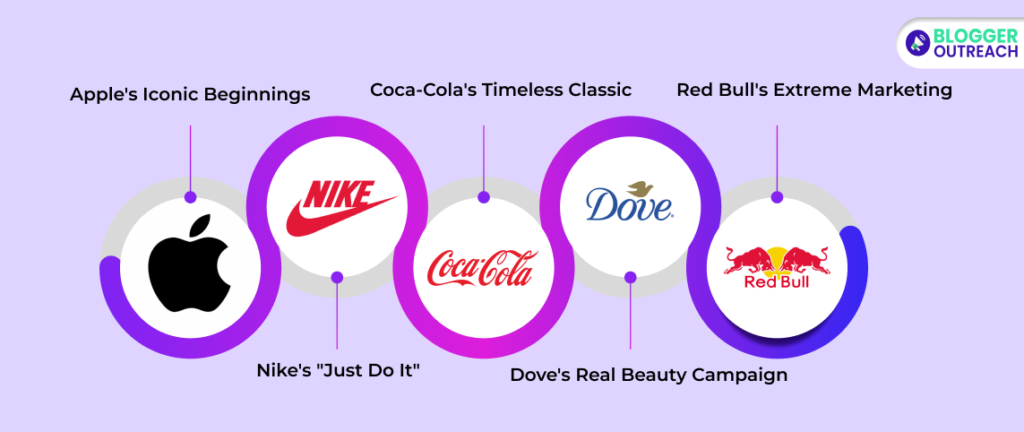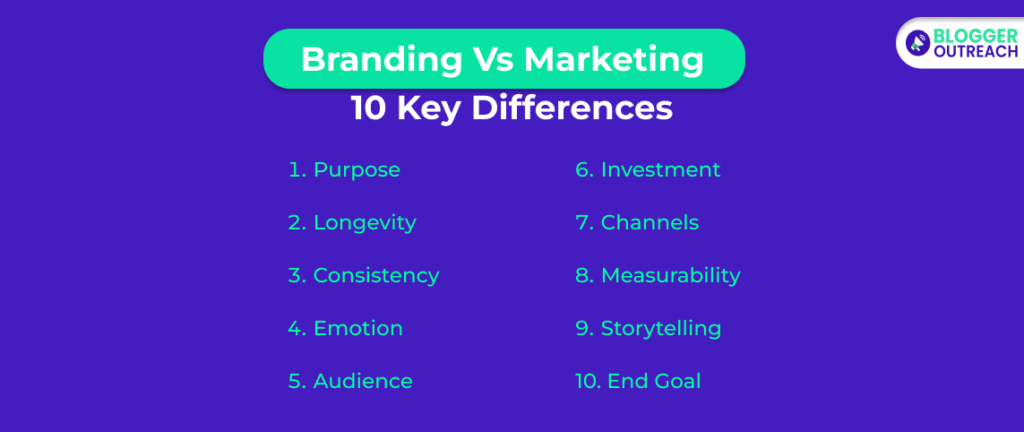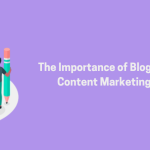Table Of Content
- 1 What Is Branding? For example, Key Questions To Ask Yourself
- 2 What Is Marketing? Example, How To Start With Marketing
- 3 Branding vs Marketing – 5 Influential Stories To Know
- 4 Branding vs Marketing – What Should Come First?
- 5 Branding Vs Marketing – 10 Key Differences
- 6 Final Verdict – Branding vs Marketing
Branding vs marketing – what are the differences? Is there anything better than the other?
You might wonder, What sets branding apart from marketing?
Well, the answer varies depending on who you ask.
If you search on the web, you will find that the true meanings of things are often blurred.
This is unfortunate because, while they often intersect, they each hold significant power as independent business concepts.
So, let’s dive in and unravel the distinction between branding and marketing once and for all.
In This Article, You Will Learn About:
- Branding
- Marketing
- Popular examples
- Key differences
- Which one is better?
What Is Branding? For example, Key Questions To Ask Yourself

Branding is like the personality of your business. It’s how you express what makes you different and special.
Think of it as your business’s unique fingerprint.
It’s like when you think of Apple and immediately associate it with sleek design and innovation. It’s what sets you apart in a crowded marketplace.
To Build A Strong Brand, Ask Yourself These Key Questions:
- What makes your business special? Identify your unique selling points.
- Who is your audience? Know your customers well and understand their needs and desires.
- How do you want your audience to feel about your brand? Whether it’s trust, excitement, or reliability, your brand should evoke specific emotions.
- What sets you apart from your competitors? Your unique qualities, products, or services should be crystal clear.
- Are your visual elements consistent? Your logo, colours, fonts, and imagery should be unified across all platforms.
- Is your message clear and easily understandable? Your brand’s messaging should be concise and resonate with your target audience.
In order for your brand representation to be effective, it must be consistent, clear, and authentic.
Your brand is more than just a logo or a tagline; it’s all the experiences people have with you. Provide a positive, memorable, and relatable experience.
What Is Marketing? Example, How To Start With Marketing

Marketing is how you communicate with people to tell them about your business.
It is all about:
- Addressing a problem.
- Understand what you have to offer.
- Why they should choose you over others.
Be clear, and friendly, and show what makes your business unique to make your marketing efforts more effective.
For example, when you use social media like Facebook, Instagram, or Twitter to post pictures and information about your products or services, that’s a form of marketing.
To Get Started With Marketing, Follow These Steps…
- Know Your Audience: Understand who your potential customers are and what they like. This helps you create messages that will resonate with them.
- Use Social Media: Utilize platforms where your target audience hangs out. Share photos, videos, and posts about your offerings. Engage with your audience by responding to comments and messages.
- Create Engaging Content: Make your marketing materials interesting and informative. Use pictures, videos, and words that capture people’s attention.
- Offer Special Deals: People love discounts and special offers. Use promotions to attract new customers and reward loyal ones.
- Track Your Results: Use tools and analytics to see how well your marketing efforts work. This helps you understand what’s effective and what needs improvement.
- Adjust And Improve: Based on your results, make changes to your marketing strategy to make it more successful. This might involve tweaking your messages, trying different platforms, or adjusting your offers.
Branding vs Marketing – 5 Influential Stories To Know

The following stories show how branding and marketing go beyond mere products. Rather, they connect with your emotions, values, and aspirations.
(i) Apple’s Iconic Beginnings
Apple’s story began in a humble garage in the late 1970s when Steve Jobs and Steve Wozniak crafted their first computer. This branding evolved with a focus on innovation, making technology accessible and user-friendly. It’s a journey from a small startup to a global tech giant, emphasizing that even the most groundbreaking brands start small.
(ii) Nike’s “Just Do It”
“Just Do It” is a slogan by Nike, and it isn’t just about selling sneakers; it’s about inspiring you to overcome challenges and reach your full potential.
Nike’s marketing campaigns have featured athletes pushing their limits, motivating you to embrace challenges with determination and confidence.
(iii) Coca-Cola’s Timeless Classic
Coca-Cola’s branding is a model of consistency. The red label, iconic logo, and refreshing taste have remained largely unchanged for over a century.
It’s a testament to the power of maintaining a strong brand image and spreading happiness globally through a universally recognized product.
(iv) Dove’s Real Beauty Campaign
Dove’s marketing stands out for its “Real Beauty” campaign. Instead of using idealized beauty standards, Dove celebrates the natural beauty of real women.
This powerful message empowers women to embrace their unique qualities and challenges conventional beauty norms.
(v) Red Bull’s Extreme Marketing
Red Bull isn’t just an energy drink; it’s also a lifestyle brand.
One of Red Bull’s marketing strategies is to sponsor extreme and thrilling events such as Red Bull Stratos and Red Bull Rampage.
This associates the brand with adventure and energy, targeting a specific audience that seeks excitement and adventure.
Branding vs Marketing – What Should Come First?
Branding should come first. It’s the foundation, setting your identity and values.
Marketing comes after promoting your products using that established identity.
Branding defines who you are, and marketing shares it with the world.
It’s like building a strong house (branding) before inviting guests (marketing).
Start with the ‘who,’ then the ‘what.’ Your brand guides your marketing.
Branding Vs Marketing – 10 Key Differences

We are about to reveal the differences in branding vs marketing. Let’s explore!
1. Purpose
Branding is the process of creating a unique and lasting identity for your business. It involves establishing a set of core values, a mission, and a vision that reflect what your company stands for.
Marketing, on the other hand, is the tactical side of promoting your products or services to a broader audience.
2. Longevity
Branding is a long-term strategy. It’s about building a reputation and recognition that endures over time.
In contrast, marketing campaigns are often short-lived, focusing on specific promotions, sales, or events with a finite duration.
3. Consistency
Branding requires maintaining a consistent look and feel in all aspects of your business – from your logo and website design to your customer service. It ensures that your audience associates a particular image with your company.
Marketing strategies, however, can change frequently to adapt to the ever-evolving market conditions.
4. Emotion
Branding is about connecting with your audience on an emotional level. It evokes feelings and associations with your brand, fostering a deeper connection with customers. Marketing, on the other hand, typically focuses on the functional aspects of your products or services – their features and benefits.
5. Audience
Branding is targeted toward your ideal audience’s perceptions, beliefs, and values. It seeks to resonate with a specific market segment, fostering a sense of belonging.
Marketing, in contrast, has a broader target – it aims to reach a wider range of potential customers, including those who may not have encountered your brand before.
6. Investment
Branding is an ongoing investment in building and maintaining your brand’s reputation and recognition. It requires a continuous commitment of resources.
Marketing campaigns, conversely, often have specific budgets and timelines, making them more short-term investments.
7. Channels
Branding permeates all communication channels your business employs. Whether it’s your website, social media, or offline materials, the branding elements should remain consistent.
Marketing, however, is channelled through specific means, such as advertising, public relations, and promotional activities, targeting particular goals or events.
8. Measurability
Marketing efforts are more quantifiable. You can measure the success of marketing campaigns through various metrics like sales, leads, click-through rates, and conversion rates.
Branding, though vital, has a more abstract impact that can be challenging to measure directly.
9. Storytelling
Branding tells the overarching story of your business. It communicates your company’s history, values, and culture. Marketing, conversely, focuses on telling the story of your specific products or services, emphasizing how they solve problems or fulfil needs.
10. End Goal
The goal of branding is to build trust, loyalty, and a strong emotional connection with your audience. It seeks to create customers who are not just buyers but brand advocates. Marketing, on the other hand, primarily aims for immediate results, such as sales, lead generation, or event attendance.
Final Verdict – Branding vs Marketing
Branding and marketing are two complementary but distinct facets of building a successful business.
So, there is nothing like one is better than the other.
First, understanding both is essential.
Branding builds your identity. Marketing promotes your products. They work together. Branding’s long-term. Marketing’s short-term.
Your brand shapes your marketing. So, neither’s better; they’re partners in your business’s success.
BloggerOutreach is an established SEO agency that specializes in branding and marketing for clients.
Whether it’s content or SEO, we guarantee increased brand recall for your business. Let us help you enhance your brand’s visibility and recognition.
For more details, check out our services.
Read Also:






